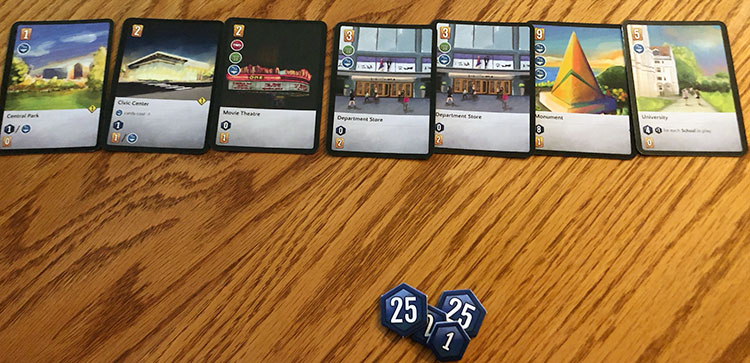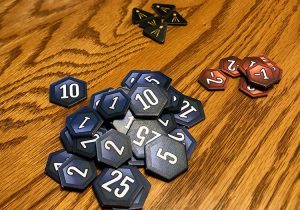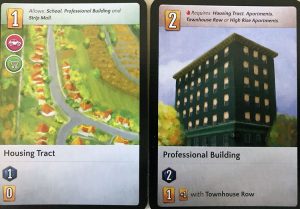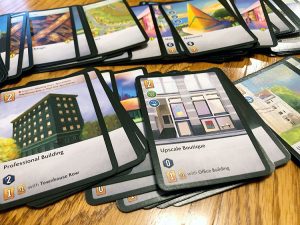 “Here. Review this,” instructed a masked Tony. He tossed me The City.
“Here. Review this,” instructed a masked Tony. He tossed me The City.
“OHHHHHH – I wanted to play Reiner’s newest game!” I exclaimed.
“That’s My City, not The City.”
“Oh… well, that is ok. I prefer western-themed games anyways.”
“That’s Carson City.”
“I know—I was just testing you. I just thought the box would be smaller since it was labeled a microdeckbuilder.”
Tony sighed. “That’s Flip City.”
I blinked. “Well, I don’t mind trying out -“
Tony interrupted me. “Just go play THAT game in your hands. Please.”
I turned around and walked home, happy to have a copy of Dice City… err, The City, in my hands.
Gameplay Overview:
The City, an engine-building card game, was originally published in 2011. Tom Lehman, the designer, also created Race for the Galaxy and Roll for the Galaxy. It was also reimplemented as Jump Drive. Two to five players can compete to build the most successful city ever constructed! Games take no longer than 30 minutes.
Each round consists of four phases:
- Every player simultaneously plays a card face down (player must be able to pay its costs)
- Once all players have placed a card facedown, players flip the card over and pay its costs
- Collect victory points generated by all cards that the player has in play
- Collect income (draw cards) generated by all cards that the player has in play
The game ends when one or more players reach 50 victory points. Whoever has the most points will be deemed the victor!

Game Experience:
I really enjoyed Race for the Galaxy until I played Roll for the Galaxy. After playing Roll, I almost immediately sold Race and Roll for the Galaxy is one of my top 10 favorite games of all time. I am providing this as background so you can understand that I enjoy Tom Lehman’s engine building designs.

The City is MUCH lighter than both Roll and Race. There are no phases to perform your actions. The game is simply play one card (any card in your hand), pay for it with other cards in your hand, collect points, and income (more cards). Repeat.
Balancing what cards to construct and what cards to use to PAY for those cards is at the heart of The City. Some cards provide points, some provide income, and others provide both. Another point to consider is that some cards need to be built to allow you to build another card. For example, you need to build the Apartments to later build a Strip Mall.
Finally, some cards have symbols on them. These symbols can lead to more income and/or points, depending on the cards you have constructed and how many of those symbols are present. For example, the Mall provides an additional income for every shopping cart symbol in your city.

You will have to tactically decide each round how you will maximize your scoring opportunities while leaving enough cards in your hand, or generating enough income, to build that expensive card you are holding. Meanwhile, you will be looking at what your opponents are constructing and how they are performing.
To me, that is the beauty of The City. It ramps up tremendously quickly. The first few rounds you will only score a couple of points each round. Each card will score in the round in which it is constructed, as well as EVERY subsequent round. Then suddenly you are scoring ten points in a round, then 15, and then… the game ends. The following happened to me several times:
Me (internally): I am SO going to win with this five-point building.
Me (externally): I think that’s… hmmm… 18 points this round, I guess.
Jerk Opponent: That’s 24 for me. I’m at 54 points. The game is over.
Me (internally and externally): *swear words*

A couple of other quick opinions. I liked the components, especially the cards. The iconography is easy to follow and, along with the excellent rulebook (really, more like a pamphlet), makes teaching the game a breeze. The card quality is also good and we all loved the art, both on the cards and the cover of the box. Finally, some might say there is a runaway leader issue. I do not agree. The game is MEANT to ramp up quickly and, if you fall behind, it is supposed to be difficult to catch up. It happened to me several times. This is intentional given how short the game is (seven to eight rounds, normally).
One thing I did not like about The City is that there is very little bad card draw mitigation. You can choose to survey instead of building a card. This allows you to draw five cards, add them to your hand, and then discard any four cards in your hand. This option is tough, especially if your competitors have NOT taken a survey action, as it precludes you from constructing a card.
I also wish there was at least some form of meaningful player interaction, even if it is only drafting or phase selection. The only interaction comes from a couple of cards that let you score based on cards your opponents have played. That being said, this did not make me NOT want to play the game.
Final Thoughts:
The City is a fun little engine builder. It is easy to teach, and it is compact and travel friendly. For my family, it is the perfect vacation game. The City plays quickly, makes you think tactically, and it is good at any player count.
Final Score: 3.5 Stars – A fun, quick engine-building card game.
 Hits:
Hits:
• Engine building in less than a half-hour
• Rapid scoring escalation builds tension
• Good at all player counts
• Quick to teach and learn
Misses:
• The only player interaction comes from scoring off of other players’ cards
• Bad card draws are difficult to mitigate






















